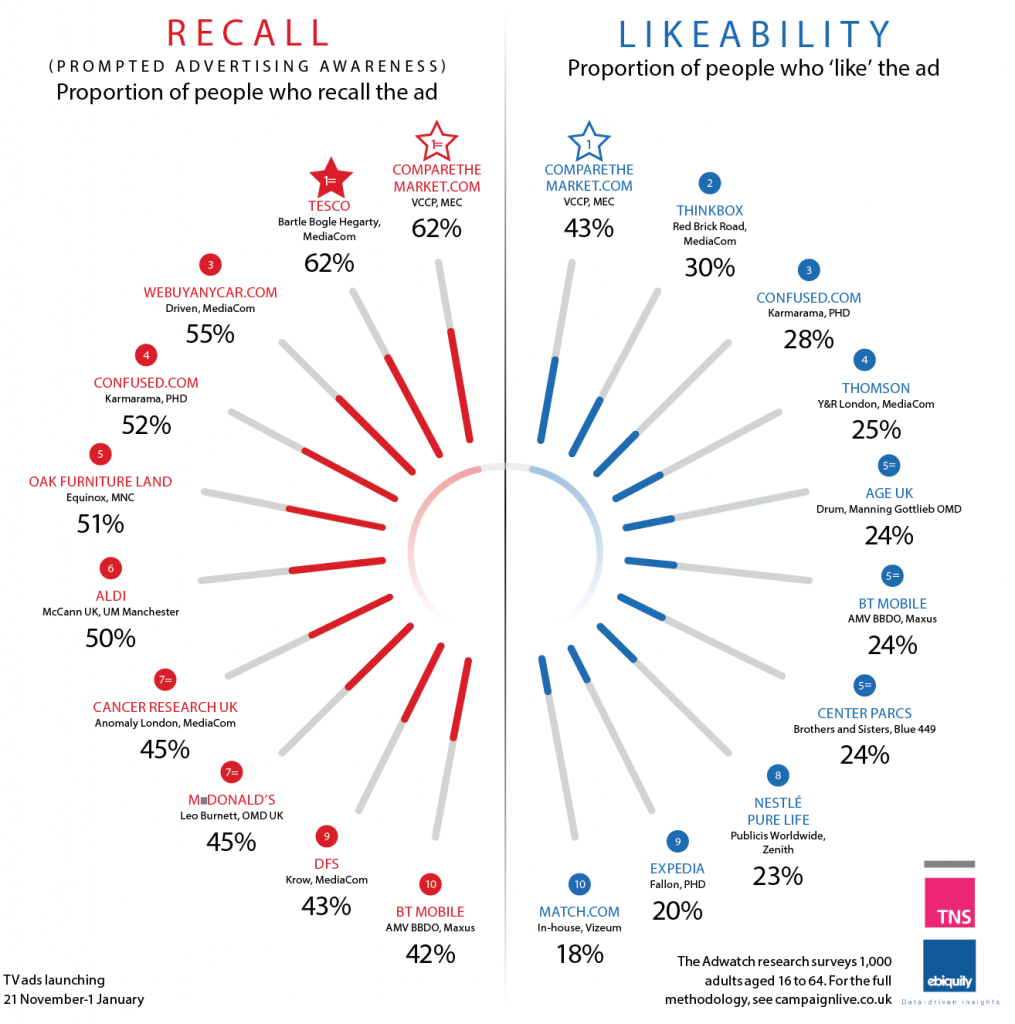Is it better to be loved or noticed? Or both?
08 Mar 2017

If you can't grab attention then your work is likely to fail. There are generally two routes: surprise or annoy. But if you annoy, will this have a detrimental effect on your brand?
The battle for your insurance money has been fought hard and long over our TV screens for many years.
These ads are not easy to foget. Sometimes not easy to like.
Go Compare has Gio Compario, the opera loving singer, developed in house.
He has frequently been the labelled the 'most irritating' ad, in fact he topped a poll of the most irritating ads of the past 15 years.
Then we have Compare the Market, developed by VCCP, who developed those cuddly Meerkats.
Same industry, same products. Again, a very high recall for the ad but with one crucial difference - people love (or at least used to love) these ads.
Now current flavour of a few months ago, the new ad upstart, the big-bottomed salaryman in high heels who loves to dance, developed by Mother:
Lastly we have confused.com. Here where you may misremember. No, it's not Brian the robot by Publicis London, but James Corden, developed by Karmarama.
Through these different approaches is a complicated relationship between likeability and consumer recall.
The most liked ads of 2016 look like this:
What you will notice is that all of the brands mentioned above feature, but with a single anomaly: the confused.com ad is for the previous campaign featuring Brian the robot.
Now let's consider the most complained about ads of 2016, which was led by Moneysupermarket and the large-bottomed salaryman. In fact the brand took both the top two positions and number four - almost one-third of the whole top 10.
The Advertising Standards Authority, which polices ads, makes the point that there is a difference between the number of complaints made and whether an ad should be banned. In fact this example exactly makes the point - none of the complaints against Moneysupermarket were upheld.
But when comparing recall of campaigns and how much people like the ads, something else emerges:

This shows that those cuddly Meerkats win both, and Confused.com (with James Corden this time) does well too.
Finally, the site adturds.com runs its own appraisal of the 'worst' ads on TV. First and second? Respectively Moneysupermarket and confused.com with James Corden. Go Compare also does well.
So what are we to make of all this?
It's simple. Ads have to grab attention, and as long as they continue to do this, they will persist.
There are two broad approaches - to annoy or to be cute and cuddly (although it's worth looking at the dark side of this too). Is the ad any good? That might be irrelevant. Does it grab attention?
But if we follow the progress of Gio Compaio for Go Compare, it's instructive. The ads came in-house and prompted two things - amazing hate, but amazing recall. If you were looking for insurance, it's there in your head.
The brand attempted to kill of Gio and made a good fist of trying this, running through a series of agencies before realising one simple truth: the annoying Gio meant the brand was recalled better.
Moneysupermarket has effectively aped this idea, but with added annoyance for a certain sector of society, so outraged they feel the impulse to complain.
The Meerkats are still riding high so expect to continue seeing them for some time.
James Corden? Well it's too early to say. His campaigns have run for less than a year and could go either way.
Whether people like Corden or not, it's whether his ads are remembered that will determine how long his ads run. If it doesn't work, then Brian could potentially be making a comeback.
But this trip through comparison website branding shows one thing - grabbing attention is not just necessary but essential to cutting through, which has applications for your copy, your tone and your brand.

Please login to comment.
Comments